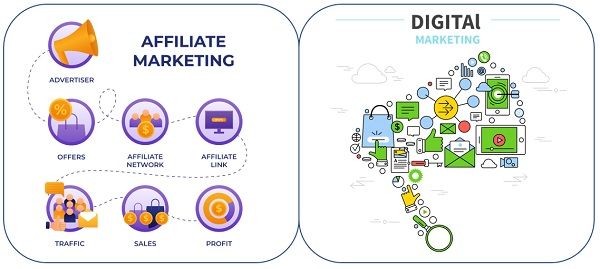
Introduction to Affiliate & Digital Marketing:
In the rapidly evolving online business landscape, two popular marketing strategies have emerged: Digital marketing and Affiliate marketing. Although both aim to increase traffic and increase revenue, they differ significantly in approach, technique and execution. This comprehensive comparison will help you understand the nuances of each and decide which one is best suited for your purposes.
Understanding Digital Marketing:
What is Digital Marketing?
Digital marketing is a broad term that encompasses various online marketing efforts. This includes promoting products or services using digital channels such as search engines, social media, email, and websites. The main objective is to reach and engage consumers through digital media.
Key Components of Digital Marketing:
1- Search Engine Optimization (SEO):
SEO involves optimizing your website to rank higher on search engines like Google. This includes keyword research, on-page SEO, and link building.
2- Content Marketing:
Content marketing focuses on creating valuable and relevant content to attract and engage the target audience. This can include blog posts, videos, infographics and more.
3- Social Media Marketing:
Leverage platforms like Facebook, Instagram, Twitter, and LinkedIn to promote your brand and interact with your audience.
4- Email Marketing:
Sending targeted emails to nurture leads, promote products, or provide valuable information to subscribers.
5- Pay Per Click (PPC) Advertising:
A paid advertising model where you pay every time someone clicks on your ad. Google Ads and Facebook Ads are shared platforms.
Pros of Digital Marketing:
- Comprehensive Control: You have complete control over your campaigns, from content creation to budgeting.
- Diversified Channels: Use different platforms to reach a broad or specific audience.
- Measurable Results: Tools like Google Analytics provide detailed insights into campaign performance.
Cons of Digital Marketing:
- Skills Required: Effective digital marketing requires knowledge of SEO, content creation, analytics, and more.
- Time Required: Building a brand and audience through digital marketing can take a lot of time and effort.
Exploring Affiliate Marketing:
What is Affiliate Marketing?
Affiliate marketing is a performance-based marketing strategy where individuals (affiliates) promote the products or services of another company and earn a commission on sales or leads through their referrals. Use different channels like blogs, social media, or email marketing to promote affiliate links.
Key Components of Affiliate Marketing:
1- Affiliate Networks:
Platforms like Amazon Associates, ShareASale, and Commission Junction connect affiliates with companies offering affiliate programs.
2- Affiliate Links:
Unique links provided to affiliates to track sales and conversions.
3- Content Creation:
Affiliates often create content such as reviews, tutorials, or comparison articles to promote products.
4- Performance Tracking:
Affiliate platforms provide tools to track clicks, conversions and earnings.
Pros of Affiliate Marketing:
- Low Initial Investment: no need to create products or services; Affiliates only promote existing ones.
- Passive Income Potential: Earn consistent commissions with effective content and SEO.
- Flexibility: Affiliates can choose which products to promote based on their location or audience.
Cons of Affiliate Marketing:
- Limited Control: Affiliates have no control over product or service quality, pricing or customer service.
- Dependence On Third Parties: Income depends on the performance of the companies you promote.
- High Competition: Many affiliates may be promoting the same products, making it difficult to differentiate.

Comparing Digital Marketing and Affiliate Marketing:
1- Control and Flexibility:
- Digital Marketing: Offers complete control over branding, messaging, and customer interactions.
- Affiliate Marketing: Relies on third-party products, limiting control over customer experience and product quality.
2- Income Potential:
- Digital Marketing: Income can be more stable and scalable depending on your product and marketing strategy.
- Affiliate Marketing: Income can be passive but is often less stable and depends on external factors such as product demand and affiliate program changes.
3- Skill Requirements:
- Digital Marketing: Requires a broad skill set including SEO, content creation, social media management, and data analysis.
- Affiliate Marketing: Focuses more on content creation, SEO, and understanding affiliate networks.
4- Initial Investment:
- Digital Marketing: Tools, advertising and content creation may require significant investment.
- Affiliate Marketing: Usually requires little upfront investment, especially if you already have a blog or social media presence.

Top Websites for Digital and Affiliate Marketing:
Digital Marketing Platforms:
Affiliate Marketing Networks:
- Amazon Associates
- ShareASale
- CJ Affiliate (formerly Commission Junction)
- Rakuten Marketing
- ClickBank
Conclusion: Which is Best for You?
Choosing between digital marketing and affiliate marketing depends on your goals, skills and resources. Digital marketing is ideal for businesses looking to build a brand and engage directly with consumers. It offers comprehensive control and significant growth potential, but requires extensive expertise and a significant investment.
On the other hand, affiliate marketing is perfect for individuals or businesses who want to generate passive income with minimal initial investment. It offers flexibility and the opportunity to earn commissions without the complexities of product creation or customer service.
Ultimately, the best path depends on your unique situation and goals. Whether you choose to dive deep into the comprehensive world of digital marketing or explore the specific approach of affiliate marketing, both strategies offer unique opportunities for growth and success in the digital landscape.


